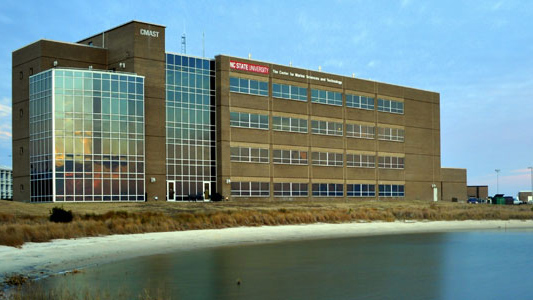Semester at CMAST
In Spring 2026, a special class of undergraduates will be bound for the coast to participate in an intensive hands-on semester in marine science. Fifteen NC State undergraduate students will spend their 2026 spring semester as resident students at CMAST, NC State’s Center for Marine Sciences and Technology.
Overview
The Semester at CMAST program allows students to get their feet wet and hands sandy alongside top professional researchers and graduate students, offering them unprecedented exposure to all facets of marine science. Semester at CMAST is the first-of-its-kind NC State commitment for a semester-long, academic coastal and marine program for undergraduate students.
Participating students will take a full, academic semester at CMAST, earning 16 Credits towards their NC State degree.
January 12: First day of Classes
January 19: MLK Day (no classes)
February 17: Wellness Day (no classes)
March 16-20: Spring Break (no classes)
April 28: Last Day of classes
April 30-May 6: Final Exams
May 9: Commencement
Students will be able to choose from the following courses:
Courses to choose from:
- Mon, Wed 9-10:15 AM. MEA493-603, Marine Policy & Management (Daniel) (room 105)
- Mon, Wed 10:45-noon. MEA 252, Biology of Marine Mammals (Thayer) (room 105)
- Tues, Thur 8:30-9:45AM. BSC 495/BIO592 (may also be listed as BIO429/529), Oceans and Human Health (Rodgers) (room 205)
- Tues, Thur 10:15-11:30 AM, MEA 350 Marine Conservation Biol (Price & Eggleston) (rm 105)
- Tues, Thur 1:15-2:30 pm AEC 424, Marine Fisheries Ecology (Buckel & Ruderhausen) (rm 105)
- MEA493-602 Natural History of Coastal NC (1 credit) – March 23-27, 202
- TBD, ES 496 & 498
- TBD, MEA493-601 (Research)
- Monday 1:30-2:30 pm Project Meetings (Thayer) Room 205
Students may also enroll in General Education courses at the adjacent Carteret Community College via their enrollment and registration process.
Seminars &/or Field trips are generally scheduled on Fridays. Seminars are in-person only.
Room 205 will be used on Mondays from 1:30-2:30 for Project check-in meetings.
Room 105 will be available for students to use between classes.
Tuition and the Student Health Insurance Plan (SHIP) costs are the same as for students on the main campus.
Lodging is available for students at the nearby CMAST Coastal Quarters. Please visit that page for rates and further information.
The CMAST Coastal Quarters is an apartment complex located within walking distance of CMAST, with large bedrooms, living area, full kitchen facilities, and backyard with patio.
Questions?
Email either Dr. David Eggleston: eggleston@ncsu.edu or Dr. Vicky Thayer: vgthayer@gmail.com.
Application
Submit completed application via e-mail attachment to:
Dr. David Eggleston
Director, CMAST
Center for Marine Sciences and Technology
303 College Circle
Morehead City, NC 28557
eggleston@ncsu.edu
and
Dr. Vicky Thayer
Marine Mammal Stranding Coordinator
Center for Marine Sciences and Technology
303 College Circle
Morehead City, NC 28557
vgthayer@gmail.com
Why CMAST?
NC State University’s Center for Marine Sciences and Technology (CMAST; cmast.ncsu.edu), located on Bogue Sound in Morehead City, supports exciting inter-disciplinary research and a rich educational experience in the marine sciences. Programs include: (1) Aquatic Animal Health & Marine Mammal Stranding Network, (2) Marine Ecology & Conservation, (3) Estuarine & Coastal Fisheries, (4) Seafood Technology, (5) Marine Resource Management and Policy, (6) Disease Ecology & Shellfish Pathology, (7) Eco-Toxicology and Eco-Physiology, and (8) K-12 STEM Marine Science Education. These programs span 3 Colleges and 6 Departments at NC State, and cross-college cooperation occurs daily. The proximity of the CMAST facility in the “coastal research triangle” of marine science facilities in Carteret County, encourages multi-institutional and cross-disciplinary research.
CMAST, UNC-Chapel Hill’s Institute of Marine Sciences, Duke University Marine Lab, and the NOAA Beaufort Laboratory are located within five miles of each other. Other nearby agencies and facilities such as the NC Division of Marine Fisheries in Morehead City, the NC Aquarium at Pine Knoll Shores and the NC Maritime Museum in Beaufort provide additional opportunities for collaborative work and experiential learning. Moreover, CMAST’s coastal setting provides access to an incredibly diverse range of habitats and ecosystems, including small estuarine tidal creeks, large estuaries systems, dynamic barrier islands, coastal shelf and hard-bottom habitats, and the Gulf Stream.
